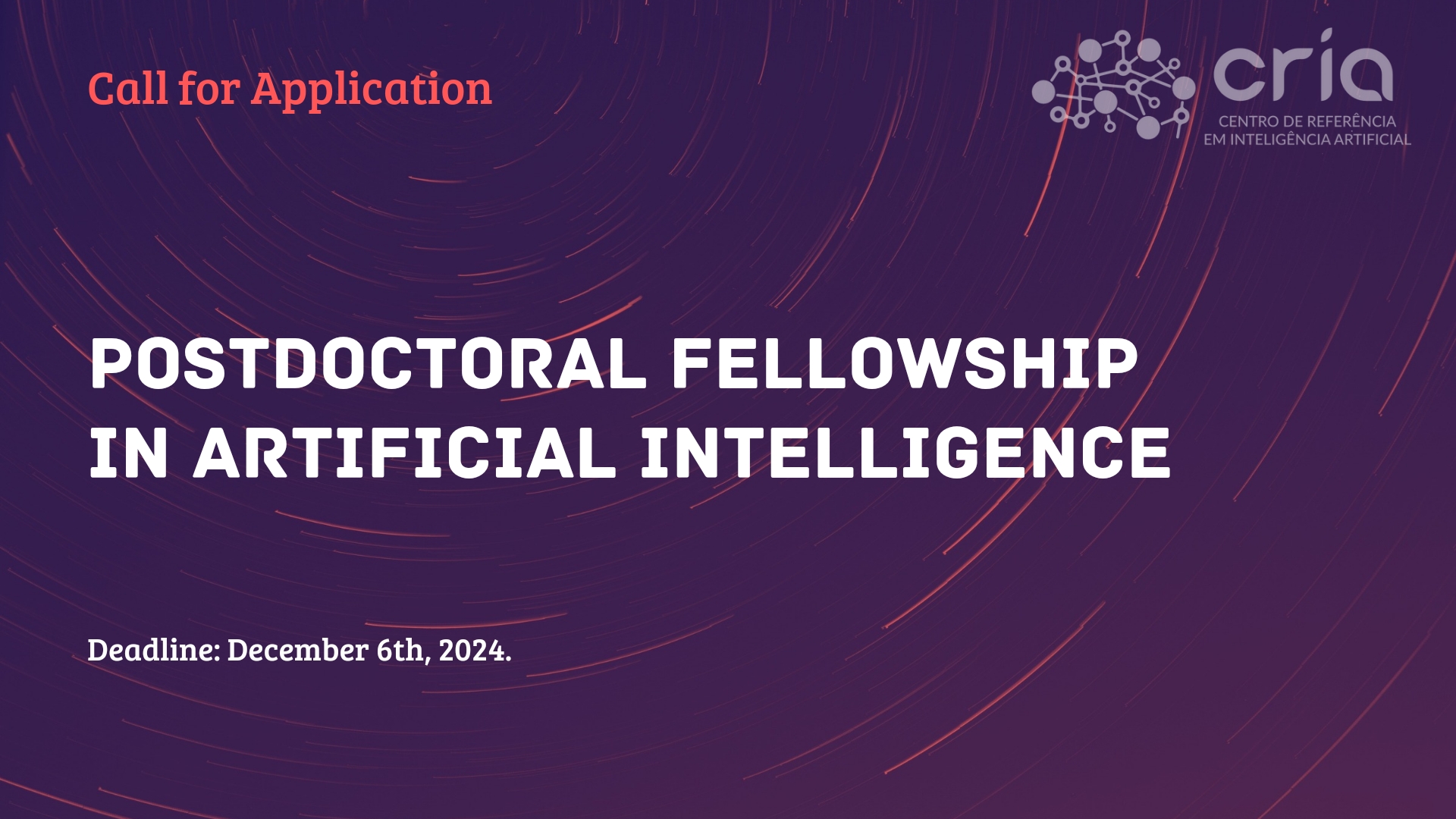The Center for Reference in Artificial Intelligence (CEREIA) is conducting an International Public Selection for a Postdoctoral Fellowship in Artificial …
Federal University of Ceará
Center of Reference in Artificial Intelligence
News, articles, and announcements
The Center for Reference in Artificial Intelligence (CEREIA) is conducting an International Public Selection for a Postdoctoral Fellowship in Artificial …
The Center for Reference in Artificial Intelligence (CEREIA) is conducting an International Public Selection for a Postdoctoral Fellowship in Artificial …
About us
CRIA
The Center of Reference in Artificial Intelligence (CRIA) at the Federal University of Ceará (UFC) is the result of the approval of the homonymous project CEREIA (Center of Reference in Artificial Intelligence) in a national selection conducted by a consortium formed by the Ministry of Science, Technology, and Innovation (MCTI), the São Paulo Research Foundation (FAPESP), and the Brazilian Internet Steering Committee (CGI.br) for the establishment of Applied Research Centers (CPAs) in Artificial Intelligence (AI).
CEREIA
CEREIA is the result of a partnership between UFC and the Hapvida Notredame Intermédica Group (HNDI). The Center was created in a time of growth in the Science, Technology, and Innovation (ST&I) sector, particularly in the area of Artificial Intelligence, which has been in the spotlight with the advent of ChatGPT and other generative AI tools. It is grounded in solid academic foundations, strengthened by a network of national and international research institutions and the contributions of Ceará’s entrepreneurship and innovation ecosystem.
WHERE ARE WE?
The Center is currently headquartered at the Computer Networks, Software Engineering, and Systems Group (GREat) facilities, located at the Pici Campus, and also has three partner institutions: the Federal University of Piauí (UFPI), the Federal University of Maranhão (UFMA), and the University of Fortaleza (UNIFOR), along with support from the Ceará Foundation for Scientific and Technological Development Support (FUNCAP) and the involvement of the Foundation for the Support of Culture, Research, and Institutional, Scientific, and Technological Development (FCETREDE).
Research Lines
There are currently six research lines under development, linked to the CEREIA project.

Chronic Disease Prediction
Leader: Prof. Dr. Javam de Castro Machado – UFC
The objective is to develop systems for identifying chronic diseases using artificial intelligence. These systems should assign risk scores to patterns associated with each individual, considering one or more chronic diseases. The tools will serve as decision-making support for medical specialists.

Support for Radiological Exam Evaluation
Leader: Prof. Dr. Pedro de Alcântara dos Santos Neto – UFPI
Development of diagnostic support tools for imaging exams based on Artificial Intelligence (AI), which can both assist healthcare professionals in their tasks and prevent incorrect diagnose

AI-Assisted Anamnesis
Leader: Prof. Dr. José Antonio Fernandes de Macedo – UFC
Develop AI-based solutions to assist the anamnesis process, focusing on structuring data, identifying patterns, and recommending diagnoses. These solutions will provide recommendations to doctors in investigating and documenting patient episodes and facts, offering a starting point for diagnosis and treatment.

Intelligent System for Remote Patient Monitoring
Leader: Prof. Dr. Guilherme Alencar Barreto – UFC
The goal is to develop applied research in multimodal intelligent monitoring systems for hospital patients using vital biosignals such as heart rate, blood pressure, oxygen saturation, temperature, intracranial pressure, among others. This will be combined with remote monitoring techniques using computer vision and pattern recognition to identify occurrences of falls, spasms, and seizures.

Patient Engagement in Health Promotion and Chronic Disease Prevention Programs
Leader: Prof. Dr. João José Vasco Peixoto Furtado – Unifor
This research aims to investigate the use of Intelligent Virtual Assistants as a tool to support prevention and health promotion programs, focusing on techniques and methods to reduce patient disengagement in medium and long-term treatments.

High-Quality Interfaces for Data Science in Healthcare
Leader: Prof. Dr. Ricardo de Andrade Lira Rabêlo – UFPI
This research plan's general objective is to make Data Science accessible to lay users in the healthcare field. It focuses on developing high-quality interfaces to help lay users locate and process the necessary medical data and documents for their projects, as well as apply typical Data Science algorithms to their data.
Knowledge Dissemination
The Coordination of Education and Knowledge Dissemination (CEDC) plans activities based on three pillars: knowledge dissemination, education, and scientific outreach. The target audiences are organized into Students, Professionals, Institutions and Academics, and the General Society. This structure in pillars and the identification of the audiences allow for more focused and qualified activities.
Support for scientific outreach through articles in leading peer-reviewed journals and scientific magazines, white papers, webinars, videos, and practical demonstrations.
Organization of multidisciplinary workshops and seminars for high school, undergraduate, and graduate students.
Support for the participation of CEREIA researchers in technical forums and regulatory discussion environments in the health sector, including the Ceará State Health Department and the Ministry of Health.
Online education, tutorial material, and training provided for students and young entrepreneurs.
Contact
Email: diretoria.cria@ufc.br
Address: Av. Mister Hull, Bloco 942-A – Pici Campus – ZIP Code 60355-636 – Fortaleza – CE – Brazil
Recent Publications



